【精编文档】2016-2017学年高中英语Unit4HelpfulSchoolmatesPeriodThreeGrammar.docx
人教高中英语必修4Unit4 Warming-up and Language points(共26
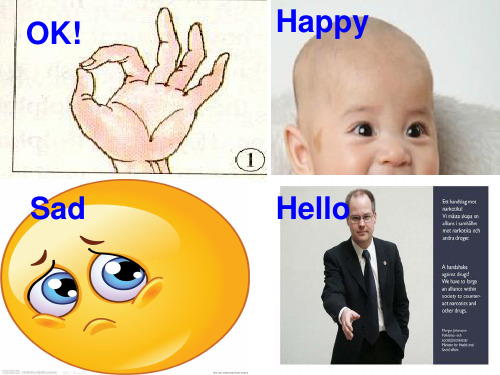
Pair work: Talk with your partner about what you are curious about.
Sample: Student A: What are you curious about? Student B: I’m curious about_________
Thank you !!!
I’d like to introduce a new friend to you, and he is curious about everything.
Pair work: What would you like to introduce to your partner? You can introduce anybody/any place/anything to your partner.
低调 !
Can you give a definition(定义) of body language according to the two tips below?
---the function of body language ---the tool of body language uses
Sample: Student A: Hello, what would you like to introduce to me? Student B: I’d like to introduce____ to you…
Summary:
Homework:
Please write a story using the phrases learned in this period after class.
Body language:
高中英语 Unit4《helping people around the world-Project
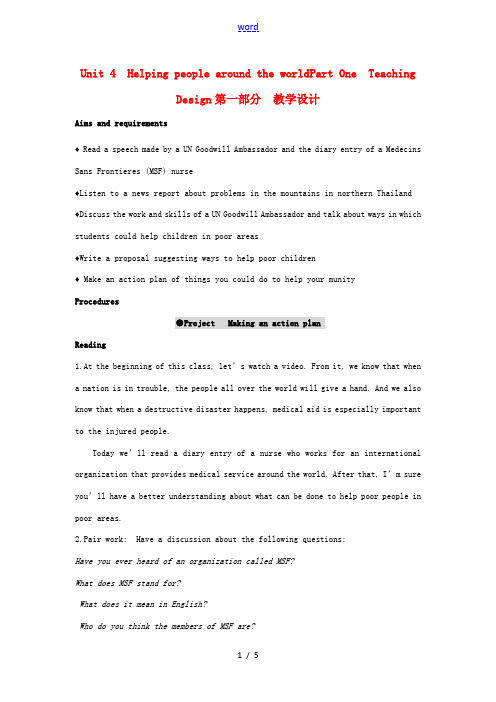
Unit 4 Helping people around the worldPart One TeachingDesign第一部分教学设计Aims and requirements♦ Read a speech made by a UN Goodwill Ambassador and the diary entry of a Medecins Sans Frontieres (MSF) nurse♦Listen to a news report about problems in the mountains in northern Thailand ♦Discuss the work and skills of a UN Goodwill Ambassador and talk about ways in which students could help children in poor areas♦Write a proposal suggesting ways to help poor children♦ Make an action plan of things you could do to help your munityProcedures●Project Making an action planReading1.At the beginning of this class, let’s watch a video. From it, we know that whena nation is in trouble, the people all over the world will give a hand. And we also know that when a destructive disaster happens, medical aid is especially important to the injured people.Today we’ll read a diary entry of a nurse who works for an international organization that provides medical service around the world. After that, I’m sure you’ll have a better understanding about what can be done to help poor people in poor areas.2.Pair work: Have a discussion about the following questions:Have you ever heard of an organization called MSF?What does MSF stand for?What does it mean in English?Who do you think the members of MSF are?What do you think the members of MSF do?For referenceAbout MSF:The MSF role in emergency medical aidMédecins Sans Frontières (MSF) is aninternational humanitarian aid organizationthat provides emergency medical assistance topopulations in danger in more than 70countries.In countries where health structures are insufficient or even non-existent, MSF collaborates with authorities such as the Ministry of Health to provide assistance. MSF works in rehabilitation of hospitals and dispensaries, vaccination programmes and water and sanitation projects. MSF also works in remote health care centres, slum areas and provides training of local personnel. All this is done with the objective of rebuilding health structures to acceptable levels.Raising AwarenessIn carrying out humanitarian assistance, MSF seeks also to raise awareness of crisis situations; MSF acts as a witness and will speak out, either in private or in public about the plight of populations in danger for whom MSF works. In doing so, MSF sets out to alleviate human suffering, to protect life and health and to restore and ensure respect for the human beings and their fundamental human rights.Only a small percentage of the populations that find themselves in a situation of danger gain the attention of the media. MSF teams travel to places that many people have never heard of, to assist those who have fallen victim to natural or man-made disasters. MSF volunteers have astory to tell when they return from their missions, and they use their experiences to speak of what they have seen. For MSF, raising awarenessfor these populations and the situations they are in is an important task. Whenever possible, MSF volunteers give interviews and make presentations.MSF offices worldwide facilitate the organization of gatherings, for individuals and groups who want to speak in their home munities. MSF alsomounts exhibitions and, from time to time, releases publications, withthe aim of raising awareness.It is part of MSF's work to address any violations of basic humanrights encountered by field teams,violations perpetrated or sustained bypolitical actors. It does so by confrontingthe responsible actors themselves, byputting pressure on them throughmobilization of the international munityand by issuing information publicly. In order to prevent promise or manipulation of MSF's relief activities, MSF maintains neutrality and independence from individual governments. The organization also tries toensure that the majority of funds raised for its work es directly from contributions from the general public. In this way, MSF guarantees equalaccess to its humanitarian assistance.MSF has been setting up emergency medical aid missions around theworld since 1971.3.Read the passage “Changing the world---my mitment” Try to answer the first questions on P63.Answers4. Read the passage again and try to judge whether the following statements are true or false.1) Although there is too much work to do, she can still afford to write her diary every day.2) The town is in ruins, but fortunately the hospital remains in good condition and usable.3) Before working in this island, she has never worked in poor areas.4) There are altogether five people on the medical team ,two doctors , one nurse and two assistants.5) She worried that malnutrition will be a problem in the future because the fields and harvest have been destroyed.6) Several MSF staff were attacked as people tried to get the food in Sudan.5. Discussion: What does the writer mean by the title “Changing the world—my mitment”?Making an action planPlanningNow let’s work in groups of four and discuss the questions on P63.PreparingWrite a plan about what you are going to do and how to put your plan into action. PresentingAt length, each group should present your plan to the whole class. Other groups can give your ments.6.Homework:Parts D1 and D2 on P127 in Workbook.。
2016-2017学年高中英语 Unit 4 Helpful Schoolmates Perio
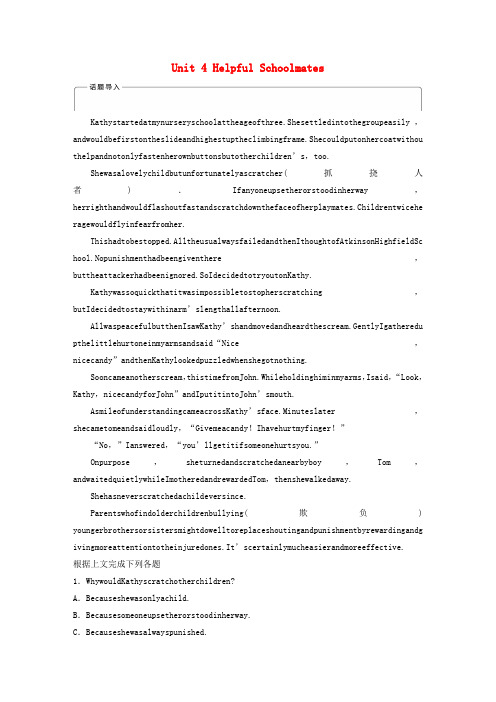
Unit 4 Helpful SchoolmatesKathystartedatmynurseryschoolattheageofthree.Shesettledintothegroupeasily,andwouldbefirstontheslideandhighestuptheclimbingframe.Shecouldputonhercoatwithou thelpandnotonlyfastenherownbuttonsbutotherchildren’s,too.Shewasalovelychildbutunfortunatelyascratcher(抓挠人者).Ifanyoneupsetherorstoodinherway,herrighthandwouldflashoutfastandscratchdownthefaceofherplaymates.Childrentwicehe ragewouldflyinfearfromher.Thishadtobestopped.AlltheusualwaysfailedandthenIthoughtofAtkinsonHighfieldSc hool.Nopunishmenthadbeengiventhere,buttheattackerhadbeenignored.SoIdecidedtotryoutonKathy.Kathywassoquickthatitwasimpossibletostopherscratching,butIdecidedtostaywithinarm’slengthallafternoon.AllwaspeacefulbutthenIsawKathy’shandmovedandheardthescream.GentlyIga theredu pthelittlehurtoneinmyarmsandsaid“Nice,nicecandy”andthenKathylookedpuzzledwhenshegotnothing.Sooncameanotherscream,thistimefromJohn.Whileholdinghiminmyarms,Isaid,“Look,Kathy,nicecandyforJohn”andIputitintoJohn’smouth.AsmileofunderstandingcameacrossKa thy’sface.Minuteslater,shecametomeandsaidloudly,“Givemeacandy!Ihavehurtmyfinger!”“No,”Ianswered,“you’llgetitifsomeonehurtsyou.”Onpurpose,sheturnedandscratchedanearbyboy,Tom,andwaitedquietlywhileImotheredandrewardedTom,thenshewalkedaway.Shehasneverscratchedachildeversince.Parentswhofindolderchildrenbullying(欺负) youngerbrothersorsistersmightdowelltoreplaceshoutingandpunishmentbyrewardingandg ivingmoreattentiontotheinjuredones.It’scertainlymucheasierandmoreeffective.根据上文完成下列各题1.WhywouldKathyscratchotherchildren?A.Becauseshewasonlyachild.B.Becausesomeoneupsetherorstoodinherway.C.Becauseshewasalwayspunished.D.Becauseshethoughtitwasrewardingforherself.答案 B2.WhydidKathyscratchTom? A.BecauseKathywasinthehabitofscratchingotherchildren. B.BecauseTomwasnearbyher. C.BecauseKathywantedTomtohurther. D.BecausethewritermotheredandrewardedTom.答案 CPeriodOne GettingReady&ReadingⅠ.重点单词1.whisper vt.耳语;悄悄说2.cheating n.欺骗;作弊cheat vi./vt.欺骗;作弊3.belief n.相信;信念believe vt.相信4.tap vt.轻拍;轻敲5.mad adj.生气的6.guard vt.守护;防御7.silence n.沉默;寂静silent adj.沉默的;寂静的8.destroy vt.破坏;毁掉9.slowly adv.慢慢地;迟缓地slow adj.慢的;迟钝的10.gently adv.温柔地;柔和地;轻轻地gentle adj.温柔的;柔和的;轻轻的11.breathe vi.呼吸;呼气;吸气breath n.呼吸;气息12.relief n.减轻;解除Ⅱ.重点短语1.keepone’seyesonsb./sth.密切注视……;注意……2.thinktooneself自个儿想;独自思考3.goagainstsb./sth.违反……;反对……;不利于……4.foramoment一会儿5.insilence沉默地;无声地6.searchforsb./sth.搜寻……;寻找……7.giveitatry试一试8.feelrelieved宽心;释然Ⅲ.好句积累1.Igavehimasmile,notsure whether hewasjoking ornot,andreturnedtomytest. 我朝他微笑了一下,不确定他是否是在开玩笑,便又继续做我的试题。
高中英语 Unit 4 Wildlife Protection Section Ⅰ Warming
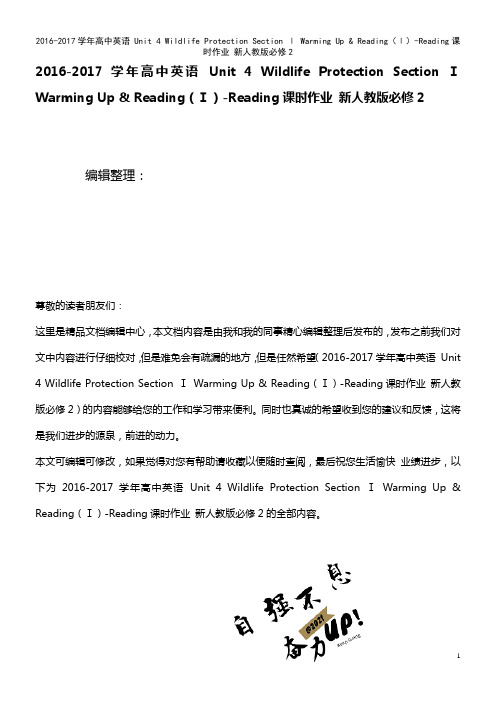
2016-2017学年高中英语Unit 4 Wildlife Protection Section ⅠWarming Up & Reading(Ⅰ)-Reading课时作业新人教版必修2编辑整理:尊敬的读者朋友们:这里是精品文档编辑中心,本文档内容是由我和我的同事精心编辑整理后发布的,发布之前我们对文中内容进行仔细校对,但是难免会有疏漏的地方,但是任然希望(2016-2017学年高中英语Unit 4 Wildlife Protection Section ⅠWarming Up & Reading(Ⅰ)-Reading课时作业新人教版必修2)的内容能够给您的工作和学习带来便利。
同时也真诚的希望收到您的建议和反馈,这将是我们进步的源泉,前进的动力。
本文可编辑可修改,如果觉得对您有帮助请收藏以便随时查阅,最后祝您生活愉快业绩进步,以下为2016-2017学年高中英语Unit 4 Wildlife Protection Section ⅠWarming Up & Reading(Ⅰ)-Reading课时作业新人教版必修2的全部内容。
Section ⅠWarming Up & Reading(Ⅰ)— Reading姓名:________ 测试时间:45分钟本卷总分:50分自评或老师评分:________基础训练Ⅰ。
Fast reading1.Daisy went to these places to see some endangered wildlife except ________。
A.Tibet B.ZimbabweC.a thick rainforest D.Indonesia2.There are not as many antelopes as there used to be in Tibet, ________。
A.because of pollutionB.thanks to the development of the industryC.as a result of killingD.for they do not produce the young fast enough3.The BEST way to protect the antelope is__________________________________。
人教版高中英语unit4课件
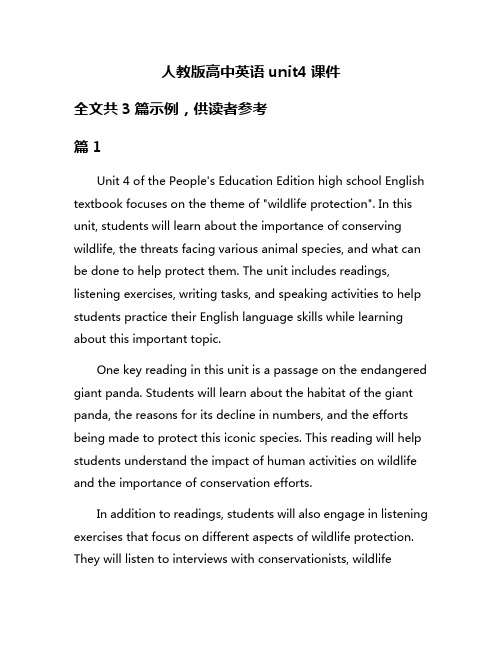
人教版高中英语unit4课件全文共3篇示例,供读者参考篇1Unit 4 of the People's Education Edition high school English textbook focuses on the theme of "wildlife protection". In this unit, students will learn about the importance of conserving wildlife, the threats facing various animal species, and what can be done to help protect them. The unit includes readings, listening exercises, writing tasks, and speaking activities to help students practice their English language skills while learning about this important topic.One key reading in this unit is a passage on the endangered giant panda. Students will learn about the habitat of the giant panda, the reasons for its decline in numbers, and the efforts being made to protect this iconic species. This reading will help students understand the impact of human activities on wildlife and the importance of conservation efforts.In addition to readings, students will also engage in listening exercises that focus on different aspects of wildlife protection. They will listen to interviews with conservationists, wildlifeexperts, and local communities to gain a deeper understanding of the challenges and successes in wildlife conservation.Writing tasks in this unit will allow students to express their own opinions on wildlife protection. They will be asked to write essays, letters, and reports on topics such as the role of zoos in conservation, the impact of climate change on wildlife, and the importance of sustainable development in protecting natural habitats.Furthermore, speaking activities will give students the opportunity to discuss these topics with their classmates and practice their oral communication skills. They will participate in group discussions, role-plays, and debates on issues related to wildlife protection, allowing them to express their ideas and listen to others' perspectives.Overall, Unit 4 of the People's Education Edition high school English textbook provides students with a comprehensive understanding of the importance of wildlife protection and the actions that can be taken to preserve biodiversity. By engaging with this unit, students will not only improve their English language skills but also develop a greater appreciation for the natural world and the need to protect it for future generations.篇2Unit 4 of People's Education Press High School English textbook is a comprehensive unit that covers various topics related to culture and festivals. In this unit, students will learn about different festivals celebrated around the world, as well as cultural traditions and customs associated with these festivals.The unit begins with an introduction to the concept of festivals and their significance in different cultures. Students will learn about the history and origins of various festivals, as well as how they are celebrated in different countries. This section also includes vocabulary related to festivals, such as decorations, rituals, and traditions.One of the main topics covered in this unit is Chinese festivals. Students will learn about traditional Chinese festivals such as the Spring Festival, Mid-Autumn Festival, and Dragon Boat Festival. They will explore the customs and traditions associated with these festivals, as well as the stories and legends behind them.In addition to Chinese festivals, students will also learn about festivals from other countries, such as Christmas, Easter, Diwali, and Thanksgiving. They will compare and contrast the customsand traditions of these festivals, as well as the similarities and differences between them.The unit also includes a section on cultural exchange programs and activities, where students can learn about different cultures and traditions through experiential learning. This could include participating in cultural exchange workshops, attending cultural performances, or even visiting cultural landmarks.Overall, Unit 4 of the People's Education Press High School English textbook provides students with a comprehensive understanding of different cultures and festivals around the world. By studying this unit, students will develop a greater appreciation for cultural diversity and learn to respect and celebrate the traditions of others.篇3Unit 4 of the People's Education Press (PEP) high school English textbook covers a variety of interesting topics related to communication skills. In this unit, students will learn how to express opinions, make suggestions, agree and disagree, and give advice in English. The unit also includes vocabulary related to communication, such as expressions for agreeing anddisagreeing, phrases for giving advice, and words for describing emotions and feelings.One of the key objectives of Unit 4 is to help students improve their spoken and written communication skills in English. The unit includes a variety of activities and exercises designed to help students practice using the new vocabulary and grammar structures they have learned. For example, students may be asked to engage in role-playing exercises where they have to express opinions or give advice to a partner. They may also be asked to write short essays or dialogue scripts that demonstrate their understanding of the new language structures.In addition to improving communication skills, Unit 4 also introduces students to different cultural perspectives on communication. For example, students may learn about the importance of politeness and indirectness in communication in some cultures, while in others, directness and assertiveness may be valued.Overall, Unit 4 of the PEP high school English textbook is designed to be engaging and informative, providing students with the opportunity to practice and improve their communication skills in English while also learning about different cultural perspectives on communication. By the end ofthe unit, students should feel more confident in their ability to express themselves in English and engage in meaningful conversations with others.。
高中英语人教版必修4《Unit 4 Discovering useful structures》
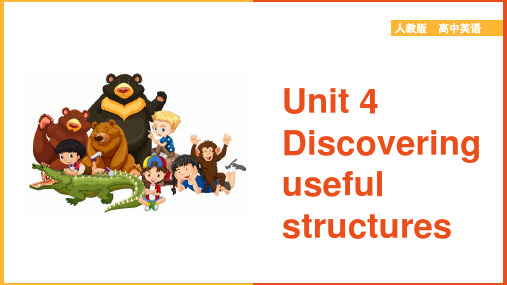
3. She stepped back appearing surprised … 4. Then Akira Nagata from Japan came in
smiling, together with … 5. …, she recognized Tony Garcia’s smiling
The XXXlight is white and blindingt,hrowing _______ (throw) hard-edged shadows on the ground.
解析:_______ hard-edged shadows on the ground 在句中作结果状语,其逻辑主语 和 句子的主语保持一致。明显,句子主语 the XXXlight 是 throw 动作的实行者, throw 相对于 the XXXlight 而言是主动动作 故填throwing。
Having done the work, he went home. 完成了工作,他就回家了。
动词-ing作状语常常和逻辑主语之间存在主 动关系,常常用来表示原因、时间、方式、 结果、条件、相伴状态等。动词-ing一样不 用作表目的的状语(通常用不定式表目的的 状语)。
1)表时间状语
Walking in the street, I came across an old friend of mine.
2)表原因状语
Being ill, he didn’t go to school. (=as he was ill, he didn’t go to school.) Being a student, you should study hard. (=Since you are a student, you should study hard.)
【精编文档】2016-2017学年高中英语Unit4HelpfulSchoolmatesPeriodTwoIntegratingSkills.docx
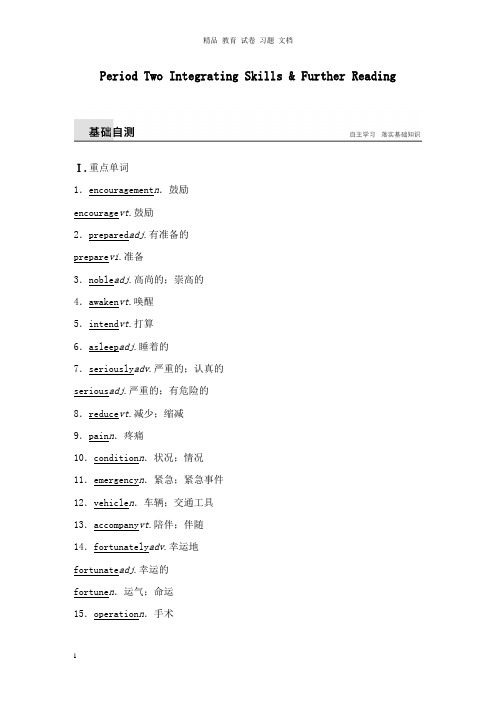
Period Two Integrating Skills & Further ReadingⅠ.重点单词1.encouragement n.鼓励encourage vt.鼓励2.prepared adj.有准备的prepare vi.准备3.noble adj.高尚的;崇高的4.awaken vt.唤醒5.intend vt.打算6.asleep adj.睡着的7.seriously adv.严重的;认真的serious adj.严重的;有危险的8.reduce vt.减少;缩减9.pain n.疼痛10.condition n.状况;情况11.emergency n.紧急;紧急事件12.vehicle n.车辆;交通工具13.accompany vt.陪伴;伴随14.fortunately adv.幸运地fortunate adj.幸运的fortune n.运气;命运15.operation n.手术operate vi.做手术;操作16.treatment n.治疗treat vt.治疗;对待;款待Ⅱ.重点短语1.feelwellpreparedforsth.为……做好了准备2.sofar到目前为止3.cheerup高兴起来4.beawakenedbysth.被……弄醒;被……唤醒5.intendtodosth.打算做某事6.tidesb.oversth.渡过;克服(困难等)7.innotime很快;立刻8.accompanysb.to(aplace)陪同某人去……9.gothroughsth.经历;完成10.allkindsof...各种各样的……11.intime及时;还早12.prepareoneselfforsth.为……做好准备Ⅲ.好句积累1.I wassleeping soundlylastnight when Iwasawakenedbysomeone’sgroans. 昨天晚上我睡得正香,突然被某个人的呻吟声惊醒了。
2017-2018学年高中英语 Unit 4 Helping people around the W
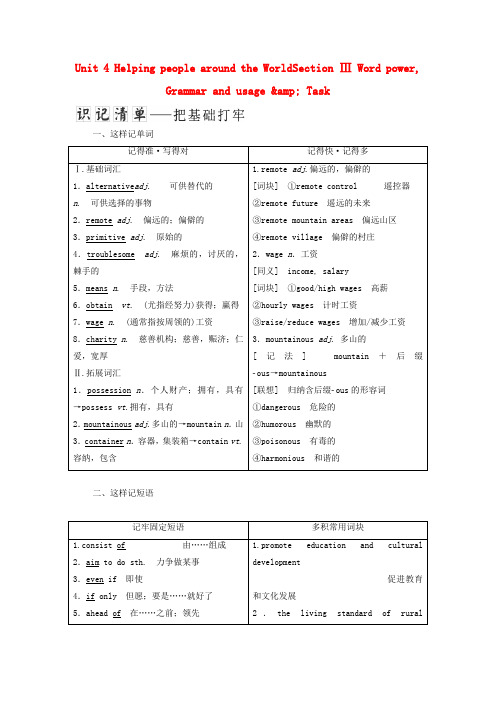
Unit 4 Helping people around the WorldSection Ⅲ Word power,Grammar and usage & Task一、这样记单词二、这样记短语三、这样记句式1.(教材P55)It consists of the first letters of each word of the name. 它由该名称的每个单词的首字母构成。
consist of 由……组成 ⎭⎪⎬⎪⎫be composed of ①Their diet chiefly 他们的饮食主要是谷类和蔬菜。
②Happiness consists_in appreciating what you have.幸福就是珍惜你所拥有的。
③What he said doesn't consist with our theory.他所说的与我们的理论不一致。
[名师点津] consist of 为及物动词短语,但不能用于进行时态和被动语态。
2.(教材P57)If I had taken an alternative path and had studied medicine, I would have a lot of medical knowledge.如果那时我选择其他的途径并学医,我现在就会掌握很多医学知识了。
alternative adj.可供替代的n .[C ]可供选择的事物阳光已被用作替代能源。
②You have no alternative but to_work (work) hard.你除了努力工作,别无选择。
③The treatment is offered as an_alternative_to surgery.这种疗法可作为替代外科手术的一种方法。
[名师点津] “除做……外别无他法;只得做某事”的表达方式还有:have no choice but to do sth./have nothing to do but do sth./can't help but do sth./can't choose but do sth. 3.(教材P57) If only there were more people donating money to charities! 要是能有更多人为慈善机构捐款就好了。
- 1、下载文档前请自行甄别文档内容的完整性,平台不提供额外的编辑、内容补充、找答案等附加服务。
- 2、"仅部分预览"的文档,不可在线预览部分如存在完整性等问题,可反馈申请退款(可完整预览的文档不适用该条件!)。
- 3、如文档侵犯您的权益,请联系客服反馈,我们会尽快为您处理(人工客服工作时间:9:00-18:30)。
Period Three Grammar & Writing语法精析一、当直接引语是表示命令、请求、劝告、提醒或警告等的祈使句时,变为间接引语须用复合宾语,即“动词+sb.+todo/nottodo”结构。
常用的动词有表示命令的order,tell和command;表示请求的ask和request;表示提醒或警告的remind和warn以及表示劝告的advise等。
例如:“Pleasecomeinandseatyourself,”shesaidtome.→Sheaskedmetocomeinandseatmyself.Hesaid,“Don’tmakesomuchnoise,children!”→Hetoldthechildrennottomakesomuchnoise.1.根据祈使句的语气,如果是强制性的,如军官、警官对下级,老板对雇员等,把say改为order或demand;如果是同级之间一般性的语气,则改为tell;如遇客气的请求,则改为ask。
2.把祈使的对象放在order,demand,tell,ask等后面作宾语。
3.把祈使句的动词原形改为不定式todo或nottodo放在宾语后面,并去掉引号。
4.人称、时间状语、地点状语等按要求进行相应变化。
注意(1)直接引语中的称呼语是祈使的对象,改为间接引语时,常作引述动词的宾语。
如直接引语中没有称呼语,改为间接引语时通常要加上宾语如me,him,us等。
例如:He said,“Go and tell her,Tom.”→He told Tom to go and tell her.(2)直接引语中如果有表示客气的please或表示强调的助动词do,改为间接引语时必须去掉。
例如:He said to me,“Sit down,please.”→He asked me to sit down.(3)含let的祈使句改为间接引语时,需根据它们表示的意义而定。
例如:He said,“Let’s go to the cinema.”→He suggested going to the cinema.→He suggested that we go to the cinema.[即时跟踪1](1)单句改错①Sheadvisedmenottellthenewstohim.tell前加to②Theteachersaidtoustostartwriting.saidto→told/asked/ordered③Heaskedyoutoclosethedoorplease.去掉please(2)将下列直接引语变为间接引语①“Wouldyoumindopeningthedoor?”heasked.→HeaskedmeifIwouldmindopeningthedoor.②“Don’trunsofast,”shesaidtohim.→Shetoldhimnottorunsofast.③Myfathertoldme,“Keepquietwhentheteacheristeaching.”→Myfathertoldmetokeepquietwhentheteacherwasteaching.④“Let’sgoforawalk,”saidmyfriend.→Myfriendsuggestedwe(should)goforawalk./Myfriendsuggestedgoingforawalk .⑤“Couldyoupleaseshowmehowtousethecomputer?”heasked.→Heaskedmeif/whetherIcouldshowhimhowtousethecomputer.二、当直接引语为表示建议、提议的祈使句或表示请求、提议、劝告、建议的疑问句时,多采用“suggest+doing/that从句(如suggest后接that从句时,从句使用虚拟语气should+动词原形,should也可省略),offer to do和ask/advise/wantsb.+todo”等结构。
例如:Johnsaid,“WhynotinviteMarytotheparty?”→JohnadvisedmetoinviteMarytotheparty.Hesaid,“Willyouhelpme,please?”→Heaskedmetohelphim.[即时跟踪2](1)句型转换①Headvisedustogooutforawalk.Hesuggestedwegooutforawalk.②Jacksuggestedthatweshouldgotothecinemathatnight. Jacksuggestedourgoingtothecinemathatnight.(2)单句改错①Hetoldmedon’tinterrupthim.don’t→notto②Myfriendsuggestedmetostarttheworkimmediately.suggested→advised③Hecommandedthatallofuswouldthinkofwaystosolvetheproblem.would→should或去掉would④Heaskedmegotovisithimthenextday.me后加to⑤Heaskedhertodosomeshoppingforhimplease.去掉please高考链接Ⅰ.填写空白处所需的内容(1个单词)或所提供单词的正确形式1.Itrulybelievethatbeautycomesfromwithin.(2015·北京,33) 2.Theexhibitiontellsuswhyweshoulddosomethingtostopairpollution.(2015·四川,8) 3.Itisdifficultforustoimaginewhatlifewaslikeforslavesintheancientwor ld.(2014·山东,7)4.Wepromisewhoeverattendsthepartyachancetohaveaphototakenwiththemovi estar.(2012·福建,35) 5.Jerrydidnotregretgivingthecommentbutfeltthathecouldhaveexpressedit differently.(2012·北京,24) 6.Ourteachersalwaystellustobelieveinwhatwedoandwhoweareifwewanttosuc ceed.(2011·四川,10)7.Whenchanginglanes,adrivershouldusehisturningsignaltoletotherdriversknowwhichlaneheisent ering(enter).(2010·上海,37)Ⅱ.单句改错(每小题仅有一处错误) 1.Doyouwanttoknowwhywemovelastweek?(2013·浙江,短文改错)move→moved2.HesaidifIdecidetodosomething,ittakeshimmuchtimetostopme. (2013·大纲全国,短文改错)said→says常用句式1.Ihadapleasantoutingwithsomeofmyclassmatestoday. 2.Wewerecompletelyamazedatthewonderandthegreatnessofnature. 3.Itwastimeforustogobackwhenthesunbegantogodown. 4.Whatawonderfulweekendwehad!5.Weenjoyedourselvesverymuch.典例展示请写一篇日记,日期为2015年5月1日,星期五,天气晴。
内容包括以下几点:1.今天是国际劳动节,是一个重大的节日;2.同朋友外出游览。
上午去东湖公园玩耍,中午在树下野餐,饭后泛舟游东湖;3.上岸后遇到外国朋友,和他们打招呼,他们报以微笑;用英语同他们攀谈,他们很少说话,后来才知道他们是俄罗斯人,不太会说英语。
注意:1.词数100左右;2.可适当增加细节,以使行文连贯。
联想词汇1.国际劳动节InternationalLabourDay2.决定做……decidetodo...3.在中午atnoon4.向某人打招呼sayhellotosb.5.与某人交谈talktosb.佳作背诵May1st,Friday,2015SunnyTodayisInternationalLabourDayandwearefreefromschool.Inthemorning,theshinningsunwokemeupandIdecidedtospendmytimetogetherwithmyfriendsin theopenair.SowewenttotheEastLakepark.Andwehadourpicnicunderabigtreeat noon.AfterlunchwerowedaboatontheEastLake.Wefoundourselvessurroundedby greenplantsandlovelyfishes,alllivingandmovingslowlyinthecleanwater.Onlandingthebank,wesawsomeforeigners.Wesaidhellotothemwithbeautifulsmilesonourfacesand receivedsweetsmiles,too.WetalkedtotheminEnglish,buttheydidn’tsaymuch.Atlast,wegottoknowtheywereRussiansandonlyknewalittleEnglish.That’sreallyapity.Ⅰ.将下列直接引语变为间接引语1.“Don’ttellhimthenews,”shesaid.→Shetoldmenottotellhimthenews.2.“Don’tsmokeintheoffice,”wesaidtohim.→Wetoldhimnottosmokeintheoffice.3.“Whydon’tyoutryagainaftersupper?”heasked.→Headvisedmetotryagainaftersupper./Hesuggestedmetryingagainaftersupper ./HesuggestedthatI(should)tryagainaftersupper.4.“Bob,besuretolockthedoorbeforeyougotobed,”mothersaid.→MothertoldBobtobesuretolockthedoorbeforehewenttobed.5.Hesaid,“Let’shavearest.”→Hesuggestedhavingarest./Hesuggestedwe(should)havearest.Ⅱ.句型转换6.“Standwhereyouare!”thepolicesaidtotheyoungman. Thepoliceorderedtheyoungmantostandwherehewas. 7.“Goandposttheletters,”themanagersaidtohim. Themanagertoldhimtogoandposttheletters.8.Momtoldmenottotellalie.Momsaidtome,“Don’ttellalie.”9.Heorderedthatweshouldgeteverythingreadythenextday.Hesaid/ordered,“Geteverythingreadytomorrow.”10.“Willyougiveupsmoking?”mywifesaidtome. Mywifeadvisedmetogiveupsmoking.Ⅲ.阅读理解ATwomenweresittingtogetherinaplane.Theywereonalongjourney.Oneofthe menwasabusinessman.Theotherwasafarmer.Theysatwithouttalkingforawhile,thenthefarmersaid,“Let’sdosomethingtopassthetime.”“Whatdoyouwanttodo?”thebusinessmanasked.“Wecanaskeachotherriddles,”thefarmersaid,“Youstart.”“Let’smaketherulesfirst,”thebusinessmansaid.“That’snotfair.Youareabusinessmanwithmuchknowledge.YouknowmorethingsthanIdo .Iamjustafarmer.”“That’strue,”thebusinessmansaid,“Whatdoyouthinkweshoulddo?”“Ifyoudon’tknowtheanswertoariddle,youpayme100.AndifIdon’tknowtheanswer,I’llpayyou50,”thefarmersaid.Thebusinessmanthoughtaboutthis,thenhesaid,“OK.That’sfair.Whowillgofirst?”“Iwill,”thefarmersaid,“Hereismyriddle.Whathasthreelegswhenitwalks,butonlytwolegswhenitflies?”Thebusinessmanrepeatedtheriddle,“Whathasthreelegswhenitwalks,butonlytwolegswhenitflies?Mm,that’sagoodone.I’mafraidIdon’tknowtheanswer.”Hegavethefarmer100,thensaid,“Tellmetheanswer.Whathasthreelegswhenitwalks,butonlytwolegswhenitflies?”“Idon’tknow,”thefarmersaidandgavehim50. 11.Thestoryhappened.A.onafarmB.inashopC.beforealongplanejourneyD.betweentwopassengers答案 D解析细节理解题。
